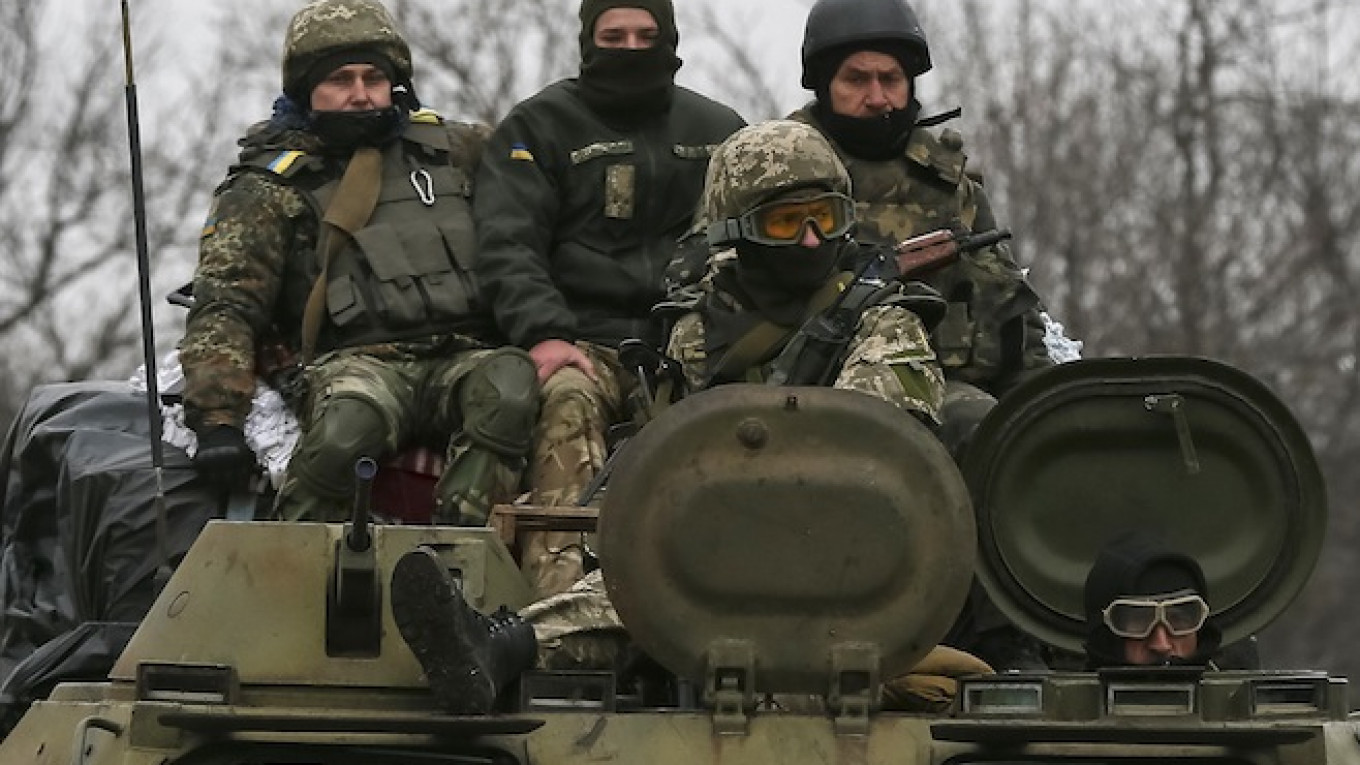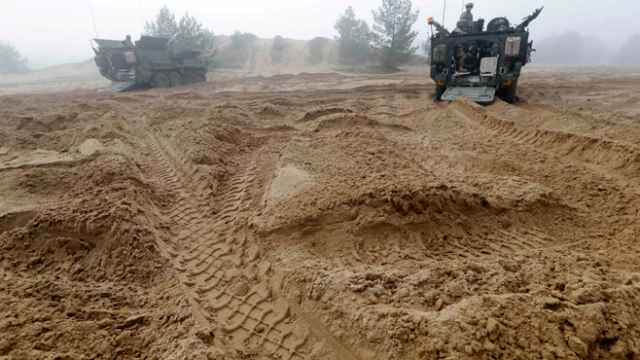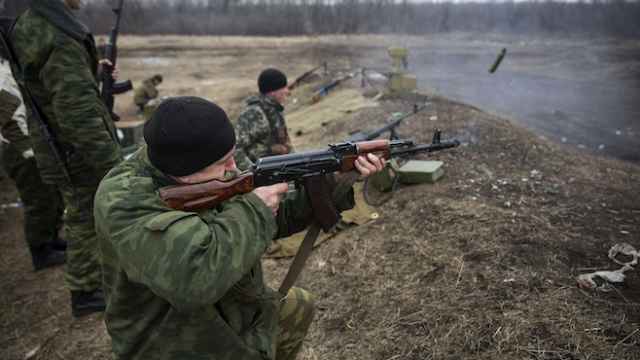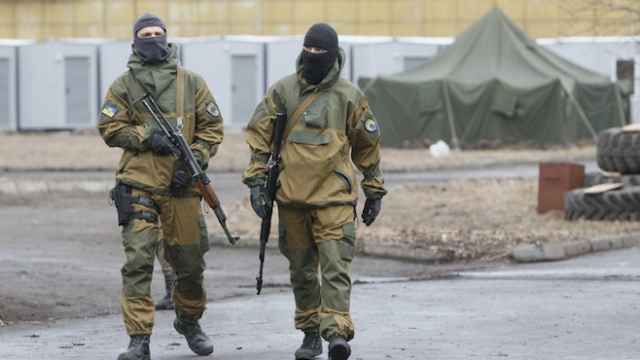Russian officials have said repeatedly following the overthrow of Ukrainian President Viktor Yanukovych last year that the ouster was a prelude to a NATO takeover of Ukraine.
These fears likely helped propel Moscow's annexation of Crimea and support of separatist rebels in Ukraine's eastern regions — moves which by turning Ukraine into a disputed territory destroyed any hopes in Kiev of swift NATO membership. The alliance will not even begin to consider a nation involved in an active internal or external conflict, or with outstanding border disputes.
But these concerns overlook the arduous process by which NATO inducts new members to its ranks. Ukraine is nowhere near being compatible with the alliance. Its security services are riven with Russian spies and a quarter of its defense budget is stolen.
Even without the confrontation with Russia, Ukraine would fail to get past the first hurdle of the accession process "because there are not only military standards but also social standards that the countries are notionally supposed to meet when applying for NATO membership," said Keir Giles, a Russia expert at Chatham House.
The Moscow Times looked at Ukraine's 3-step plan to overcome the obstacles and get into the alliance.
Step One — Interviews and Consultations
The first step in any serious Ukrainian bid to join NATO would be to declare its intent to join the alliance. This involves renouncing its 'nonaligned' status, which Kiev did last year in response to Russia's annexation of Crimea and subsequent support for pro-Russian rebels in eastern Ukraine.
NATO, for its part, would have to extend an invitation to begin working out a path to accession — which it has not done. This can only be done by unanimous consent of the allies, according to the alliance's official guidelines for aspiring members.
This process would involve several rounds of consultations at NATO headquarters in Brussels, where representatives of both sides would examine in depth the state of Ukraine's military, intelligence services, economy and political system.
The two sides would then via the NATO-Ukraine commission, which has existed since the early 1990s, launch a guided reform program known as a Membership Action Plan (MAP) — "a program of advice, assistance and practical support tailored to the individual needs of countries wishing to join NATO," according to NATO.
Step Two — Reform, Reform, Reform
Once a Membership Action Plan to accession had been hashed out and agreed upon by all parties, Ukraine would have to reform its corrupt and inefficient military and intelligence services, as well as bring its economy and political system closer in line with the standards of a European liberal democracy.
"There is an argument that [NATO's] standards have been waived in the past to fast-track countries into NATO," Chatham House's Giles said, but "it would be so blatantly obvious that [Ukraine] didn't conform with parts of the MAP … that it's really a non-starter."
The Ukrainian army's Soviet-era equipment, level of training, and capabilities have degraded its ability to defend itself, let alone contribute to anything to NATO's mission of combined territorial defense — the fundamental requirement of any aspirant nation.
Even under Kiev's new pro-Western and ostensibly reform minded government, the military has huge problems to overcome. It has not seen any modernization efforts for 20 years, and appears mainly to have existed to guard arsenals of Soviet hardware to be sold on the global arms market.
Ukrainian Defense Minister Yury Biryukov in January said "it is estimated that about 20 to 25 percent of all money [allocated to the military] is now stolen," Ukrainian news agency Ukrinform reported, citing an interview given to the Channel 5 television station.
Ukraine's 2015 budget devotes 86 billion hryvna ($3.9 billion) to defense, which according to Biryukov's estimates will translate into losses to corruption of anywhere from $780 million to $975 million.
To put this in perspective, Ukraine's military loses more money to graft than NATO members Hungary, Bulgaria, Estonia, Lithuania and Latvia have each budgeted for defense in 2015.
Biryukov said the only hope to remedy the situation would be for the military prosecutor's office to step into the Defense Ministry to restore law and order, but said that office too is consumed by a state of "total corruption," Ukrinform reported.
Ukraine's security services, the SBU, is also rife with corruption, creating another barrier to NATO entry.
Allied intelligence services need to be trusted to handle NATO intelligence information, but the SBU is reportedly littered with Russian intelligence officers and double agents that are undermining the Ukrainian government.
The Wall Street Journal reported on Wednesday that the U.S. is already careful about what it shares with the SBU because of fears that information will pass straight to Russian security services.
Assuming that Ukraine was able to reform its military and intelligence services to fall roughly in line with NATO standards, there are still the political and economic reforms demanded of the Washington Treaty — the alliance's founding document, also known as the North Atlantic Treaty.
"Requirements include a democratic political system based on a market economy, the fair treatment of minority populations, and a commitment to resolve conflicts peacefully," according to NATO.
Step Three — Induction
If Ukraine was close enough in line with the military, social and political principals NATO proclaims, the final step in the process would be the formal bureaucratic procedure of joining the alliance.
First, all 28 members of the North Atlantic Council, NATO's governing body, would have to agree to extend an invitation to Ukraine. Then the process gets even more tedious.
To make Ukraine a full ally, an amendment would have to be be made to the 1949 Washington Treaty. Once amended, the treaty must then be re-ratified by all 28 member governments and Ukraine according to their own internal political processes.
Once that is all done, the updated treaty would return to the U.S. State Department, which keeps the treaty document. Only then could the the NATO secretary general declare Ukrainian membership official.
Ukraine and NATO Today
Ukraine tried to go down this road at the 2008 NATO summit in Bucharest, but France and Germany refused to extend Kiev an offer to launch a Membership Action Plan.
By 2010, when President Viktor Yanukovych came to power, Ukraine dropped its aspirations to join NATO. The country's parliament voted to declare nonaligned status later that year.
But after Russia's annexation of Crimea and support for pro-Russian rebels in eastern Ukraine last year, Kiev has begun to take tiny steps toward joining the alliance. Ukraine first renounced its "nonaligned" status. Then, at a NATO summit in Wales last September, the two sides agreed to pursue a series of Annual National Plans, which the NATO official described as "geared toward reform more generally, with no membership implications."
Russia can relax — the Annual National Plans are a way for NATO to offer advice that might help Ukraine pursue a Membership Action Plan later on, but do not commit the alliance to giving any real support.
And even with such support, Ukraine is a long time and a lot of reforms away from joining.
A Message from The Moscow Times:
Dear readers,
We are facing unprecedented challenges. Russia's Prosecutor General's Office has designated The Moscow Times as an "undesirable" organization, criminalizing our work and putting our staff at risk of prosecution. This follows our earlier unjust labeling as a "foreign agent."
These actions are direct attempts to silence independent journalism in Russia. The authorities claim our work "discredits the decisions of the Russian leadership." We see things differently: we strive to provide accurate, unbiased reporting on Russia.
We, the journalists of The Moscow Times, refuse to be silenced. But to continue our work, we need your help.
Your support, no matter how small, makes a world of difference. If you can, please support us monthly starting from just $2. It's quick to set up, and every contribution makes a significant impact.
By supporting The Moscow Times, you're defending open, independent journalism in the face of repression. Thank you for standing with us.
Remind me later.






